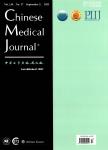Treatment of urinary lithiasis following kidney transplantation with extracorporeal shock-wave lithotripsy
Treatment of urinary lithiasis following kidney transplantation with extracorporeal shock-wave lithotripsy作者机构:Department of Urology General Hospital of Chengdu Military Command Chengdu Sichuan 610083 China
出 版 物:《Chinese Medical Journal》 (中华医学杂志(英文版))
年 卷 期:2011年第124卷第9期
页 面:1431-1434页
核心收录:
学科分类:1004[医学-公共卫生与预防医学(可授医学、理学学位)] 0905[农学-畜牧学] 09[农学] 10[医学]
主 题:kidney transplantation lithiasis extracorporeal shock-wave lithotripsy
摘 要:Background The incidence of urinary lithiasis following kidney transplantation is very low, and decision-supporting data are not available. The aim of this study was to review the diagnosis and treatment of urinary lithiasis following kidney transplantation, which is of realistic significance to reduce urinary lithiasis following kidney transplantation, prolong the survival of renal *** The incidence, diagnosis and treatment of urinary lithiasis in ten patients following kidney transplantation were analyzed retrospectively. Seven out of these patients had stones sized approximately 0.4-1.1 cm, and they were treated with low-voltage, low-frequency extracorporeal shock-wave lithotripsy (ESWL). Two patients had stones sized 0.3 cm and they underwent cystoscopy and ureteroscopy. The ureteral catheter endoscopes were inserted in a retrograde manner to mobilize stones repeatedly. After elimination of obstruction, a ureteral double J stent was *** patient had a pelvic stone (1.2 cm), which was removed *** The major clinical manifestations were hematuria, oliguria or anuria. Some patients were asymptomatic and they were diagnosed through laboratory tests and imaging examinations, e.g., ultrasonography. After elimination of obstruction, subjective symptoms disappeared in all patients, and the function of renal allografts recovered. A six-month follow-up indicated no remnant stones or lithiasis *** The diagnosis and treatment of renal allograft lithiasis are challenging. After prompt and appropriate treatment, the prognosis was satisfactory, and permanent renal functional impairment did not occur in most patients.



